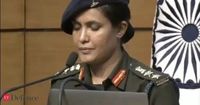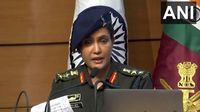In a significant military operation, the Indian Armed Forces launched 'Operation Sindoor' on Wednesday, May 7, 2025, targeting nine terror hideouts associated with groups like Jaish-e-Mohammed, Lashkar-e-Taiba, and Hizbul Mujahideen in Pakistan and Pakistan-occupied Kashmir. This decisive action comes in response to the tragic Pahalgam terror attack on April 22, which resulted in the deaths of 26 civilians, predominantly tourists.
During a press briefing held on the same day, Foreign Secretary Vikram Misri, along with Colonel Sophia Qureshi of the Indian Army and Wing Commander Vyomika Singh of the Indian Air Force, provided details about the operation. Colonel Qureshi, who hails from Gujarat and holds a postgraduate degree in biochemistry, is a decorated officer from the Indian Army’s Corps of Signals and has made history by becoming the first woman to lead an Indian Army training contingent at the multinational exercise, Force 18.
Colonel Qureshi has a distinguished background, coming from a military family—her grandfather served in the Indian Army, and she is married to an officer from the Mechanised Infantry. Her military career began in 1990 when she was commissioned as a lieutenant from the Officers Training Academy in Chennai. She has extensive experience in peacekeeping operations, including a notable deployment with the United Nations Mission in Congo in 2006, where she monitored ceasefires and supported humanitarian efforts in conflict zones.
At the press conference, Colonel Qureshi emphasized the importance of the operation, stating, "Operation Sindoor was launched to give justice to the victims of the Pahalgam terrorist attack." The operation, conducted between 1:05 am and 1:30 am, targeted four terror sites inside Pakistan and five within Pakistan-occupied Kashmir, with the Defence Ministry describing it as "focused, measured and non-escalatory," ensuring no Pakistani military installations were targeted.
Highlighting the operation's significance, the Defence Ministry declared, "These actions are in direct response to the horrific Pahalgam attack," reinforcing India's commitment to holding those responsible accountable. The Indian government later released an official video declaring the mission a success, while Pakistani authorities reportedly found themselves caught off guard.
Colonel Qureshi’s leadership has been praised by senior military officials, including the then Army Commander of Southern Command, Lt Gen Bipin Rawat, who noted that her selection was based on her capabilities and leadership qualities rather than her gender. In 2016, she led the Indian team at Exercise Force 18, marking a historic moment as the only female commander among 18 participating nations.
In addition to her military accomplishments, Colonel Qureshi has been an advocate for women in the armed forces, encouraging young women to pursue careers in the military. "If possible, join the Indian Army," she said, emphasizing the opportunities available for women in this field.
The operation has garnered widespread attention, not only for its military implications but also for the representation of women in leadership roles within the Indian Armed Forces. Colonel Qureshi and Wing Commander Singh’s presence at the briefing signals a shift towards greater inclusion of women in military operations and decision-making processes.
As tensions remain high following the Pahalgam attack, the Indian government has taken additional measures, including downgrading diplomatic ties with Pakistan and suspending the Indus Waters Treaty. These actions reflect a broader strategy to respond decisively to terrorism while maintaining a commitment to de-escalation.
Colonel Qureshi’s role in Operation Sindoor highlights not only her personal achievements but also the evolving landscape of military leadership in India. As she continues to break barriers and set new precedents, her story serves as an inspiration for many aspiring female officers in the armed forces.
In summary, 'Operation Sindoor' represents a significant military response to terrorism and underscores the growing role of women in the Indian military. With leaders like Colonel Qureshi at the forefront, the Indian Armed Forces are not only addressing immediate threats but also paving the way for future generations of women in uniform.






